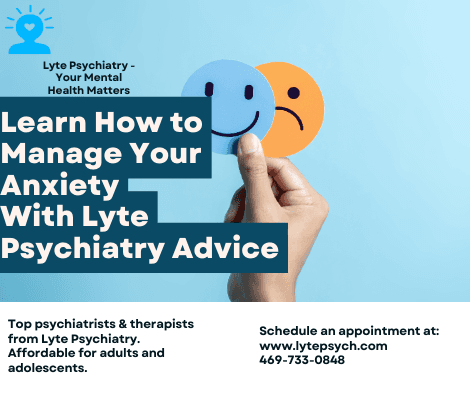Mon Jun 10 2024
Managing Anxiety Symptoms: Expert Advice from Top Psychiatrists & Therapists at Lyte Psychiatry (Affordable Adults and Adolescents Therapist and Psychiatrist Near You) Best Therapist and Psychiatrist Near You Dallas, Fort Worth, TX

Managing Anxiety Symptoms: Expert Advice from Top Psychiatrists & Therapists at Lyte Psychiatry (Affordable Adults and Adolescents Therapist and Psychiatrist Near You)
Anxiety is a natural response to stress and can be beneficial in some situations. However, when anxiety becomes overwhelming and persistent, it can interfere with daily activities and overall well-being. Common symptoms of anxiety include excessive worry, restlessness, fatigue, difficulty concentrating, irritability, muscle tension, and sleep disturbances.
The Importance of Professional Help
Seeking professional help is crucial for managing anxiety effectively. Psychiatrists and therapists at Lyte Psychiatry specialize in diagnosing and treating anxiety disorders. They offer personalized treatment plans that may include therapy, medication, or a combination of both, tailored to meet individual needs.
Effective Strategies for Managing Anxiety
Cognitive Behavioral Therapy (CBT):
Cognitive Behavioral Therapy (CBT) is a widely used and effective treatment for anxiety. It focuses on identifying and changing negative thought patterns and behaviors that contribute to anxiety. Therapists at Lyte Psychiatry use CBT to help patients develop healthier coping mechanisms and reduce anxiety symptoms.
Mindfulness and Relaxation Techniques:
Mindfulness practices, such as meditation and deep breathing exercises, can help manage anxiety by promoting relaxation and reducing stress. These techniques encourage individuals to stay present and focused, preventing the mind from getting overwhelmed by worries about the future or past.
Medication Management:
In some cases, medication may be necessary to manage anxiety symptoms. Psychiatrists at Lyte Psychiatry may prescribe medications such as selective serotonin reuptake inhibitors (SSRIs) or benzodiazepines to help reduce anxiety. Medication is often used in conjunction with therapy for optimal results.
Lifestyle Changes:
Making lifestyle changes can significantly impact anxiety levels. Regular physical exercise, a balanced diet, adequate sleep, and reducing caffeine and alcohol intake can all help manage anxiety. Psychiatrists and therapists at Lyte Psychiatry can provide guidance on incorporating these changes into your daily routine.
Support Groups and Social Connections:
Joining support groups or connecting with friends and family can provide emotional support and reduce feelings of isolation. Sharing experiences with others who understand what you are going through can be incredibly comforting and beneficial for managing anxiety.
Call to Action with Lyte Psychiatry and Schedule an Appoinment (Affordable Therapist and Psychiatrist Near You)
If you are struggling with anxiety, don't hesitate to seek professional help. The experienced psychiatrists and therapists at Lyte Psychiatry are here to provide personalized treatment and support. Contact Lyte Psychiatry today to schedule an appointment and take the first step towards managing your anxiety effectively.
To Schedule an appointment. Click Here
To see our services. Click Here
Call us if you have questions at 469-733-0848
FAQs
Q: What are the common symptoms of anxiety?
A: Common symptoms of anxiety include excessive worry, restlessness, fatigue, difficulty concentrating, irritability, muscle tension, and sleep disturbances.
Q: How can Cognitive Behavioral Therapy (CBT) help with anxiety?
A: CBT helps by identifying and changing negative thought patterns and behaviors that contribute to anxiety. It equips individuals with healthier coping mechanisms to manage their symptoms.
Q: Are medications effective for treating anxiety?
A: Yes, medications such as SSRIs and benzodiazepines can be effective in reducing anxiety symptoms, especially when used in conjunction with therapy.
Q: What lifestyle changes can help manage anxiety?
A: Regular exercise, a balanced diet, adequate sleep, and reducing caffeine and alcohol intake can all help manage anxiety.
Q: Is mindfulness effective in managing anxiety?
A: Yes, mindfulness practices such as meditation and deep breathing exercises can promote relaxation and reduce stress, helping to manage anxiety.
Q: When should I seek professional help for anxiety?
A: If anxiety is interfering with your daily life and well-being, it is important to seek professional help. Early intervention can prevent symptoms from worsening and improve quality of life.